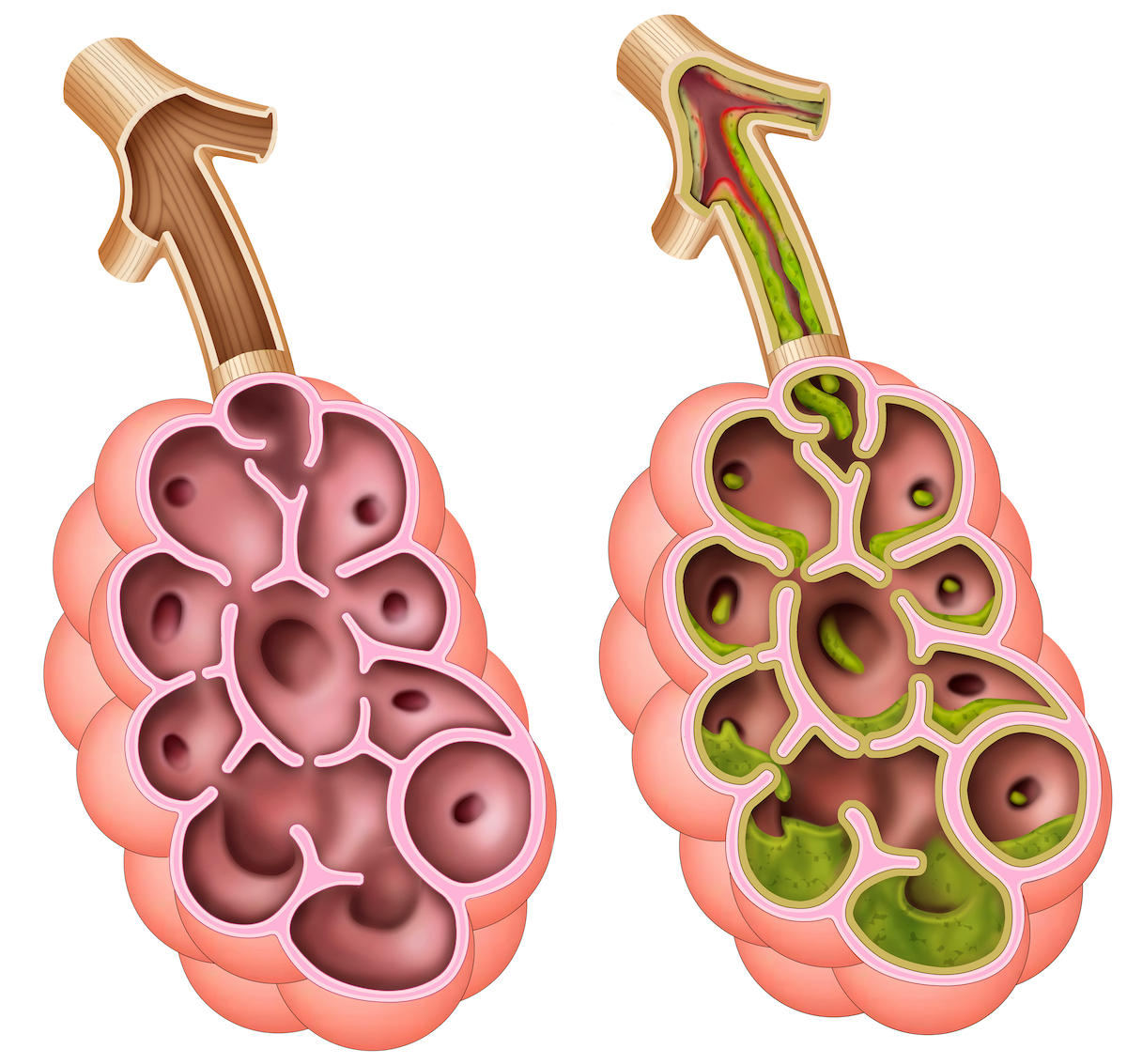- Cystic fibrosis is a life-threatening genetic disorder that can significantly shorten the lifetime of its sufferers.
- There is no cure for this condition, but symptoms can be treated with medical cannabis, which can provide great relief for patients. Here we explain why.

Cystic fibrosis is an inherited condition that alters the respiratory, digestive, and reproductive systems in the human body. More specifically, it affects the epithelial cells in the lungs, the pancreas, the liver, the sweat glands, and the digestive tract.
Epithelial cells normally release a layer of sticky mucus that captures dust and germs and acts as a lubricant. Cystic fibrosis patients have inherited a faulty gene that makes epithelial cells produce a protein (also faulty) that causes the formation of thicker, more sticky secretion which can lead to many serious issues.
For instance, instead of acting as a lubricant in the lungs, it obstructs the airways and captures bacteria that can cause infections, lung damage, and eventually respiratory failure.
In the pancreas, this thick mucus can also clog the channels that transport digestive enzymes from the pancreas to the small intestine. Without these digestive enzymes, the intestine cannot fully absorb the nutrients from ingested food.

Common symptoms include chronic cough, wheezing (acute respiratory noise), shortness of breath, pulmonary infection, diarrhoea, severe constipation, heartburn, general fatigue, and even development disorders.
Cystic fibrosis can also cause infertility problems. Around 97% of male sufferers are infertile, but not sterile. In other words, they produce sperm but this is trapped in the testicles as the illness clogs the tubes that carry the sperm to the penis' ejaculating ducts.
Why is marijuana effective in the treatment of cystic fibrosis?
There is currently no cure for cystic fibrosis. Doctors treat symptoms individually because these can vary significantly from one patient to another. They specifically focus on prevention and on the treatment of infections and intestinal blockages, as well as on eliminating lung mucus. Ensuring appropriate nutrition is also key.
The treatment of symptoms can provide better quality of life for patients, which can be further improved through the use of medical marijuana. Although research is rather limited, cannabinoids have been proven to produce a wide range of effects on the human body, many of which are aligned with the symptoms of cystic fibrosis. Medicinal cannabis may not fully alleviate symptoms, but it can help decrease their seriousness in different ways:
- Medical marijuana is known to increase appetite and reduce nausea. Therefore, it can help with appetite loss, although it is unlikely that it plays a part in nutrient absorption. However, the more you eat the more chances you have of gaining nutrients, so it may contribute to this indirectly.
- Another cystic fibrosis symptom is pain, especially abdominal and chest pain. Some patients also suffer from kidney and gallbladder stones, which can produce acute pain in the form of colics. Marijuana showcases an analgesic effect that can alleviate this discomfort.
- Another symptom is inflammation, particularly in the lungs. Cannabinoids exhibit an anti-inflammatory effect, and lungs also have cannabinoid receptors, so it is likely that cannabis helps reduce inflammation in this area.
- Some cystic fibrosis sufferers must deal with frequent bouts of diarrhoea due to the effects of the disorder on their digestive systems. Cannabinoids can also help reduce this symptom, which in turn helps prevent nutrient loss.
Treatment of cystic fibrosis with cannabis
There is a very limited amount of scientific material in connection with medical cannabis and cystic fibrosis. In fact, it seems that few scientists have researched this, perhaps because approximately half of the patients are children. But it doesn't mean that there aren't any research studies at all.
In 2001, Doctor Ester Fride analysed the numerous applications of medical cannabis in her article Cannabinoids and Cystic Fibrosis- A Novel Approach to Etiology and Therapy. Not only did she discuss the properties that had already been previously proven, but also suggested that medical cannabis could help as a powerful bronchodilator.

And in 1998, Raphael Mechoulam also studied the effects of THC as a nausea and vomiting reliever in chemotherapy patients. Even though this study was not directly related to cystic fibrosis, these patients often experience vomiting, which contributes to appetite loss, which in turn can lead to the undernutrition associated to the disease.
Forms of administration for the treatment of cystic fibrosis
Smoking marijuana is a popular choice with almost instantaneous results, but it's not the best form of administration for cystic fibrosis patients, as smoking irritates the lungs. However, there are other ways of taking medical cannabis that aren't as harmful:
- One of the options is vaping: a combustion-free method in which a vaper heats the air around the cannabis and turns it into vapour. As the heating point is lower, it reduces the by-products created during the process and is less aggressive on the lungs.
- If you don't like the idea of vaping marijuana, edibles may be a suitable alternative for you. Effects kick in from 30 minutes to a few hours later, but you'll feel them for longer than when smoked or inhaled.
- Another option is a topical treatment based on lotions, ointments, balms, or oils. Tinctures are also a good choice and can be applied under the tongue for quicker absorption.
But you can also use a combination of several methods to create a system best suited to your symptoms.
There are cannabis strains suitable for different times of the day. For instance, you can use an edible product, such as an infusion from an Indica-dominant variety, one or two hours before going to bed, so that its effects last all night. In the morning you might prefer vaping an energising Sativa strain for quick results so you're ready for the day.

Cannabis has very few side effects, and they're generally mild. Often those secondary effects, like appetite or sleep stimulation, can be extremely beneficial for cystic fibrosis patients. Even so, it's important to know how to choose the right strain so symptoms are treated more effectively. And whenever possible, under appropriate medical supervision.



Comments from our readers
There are no comments yet. Would you like to be the first?
Leave a comment!Did you like this post?
Your opinion about our seeds is very important to us and can help other users a lot (your email address won't be made public).